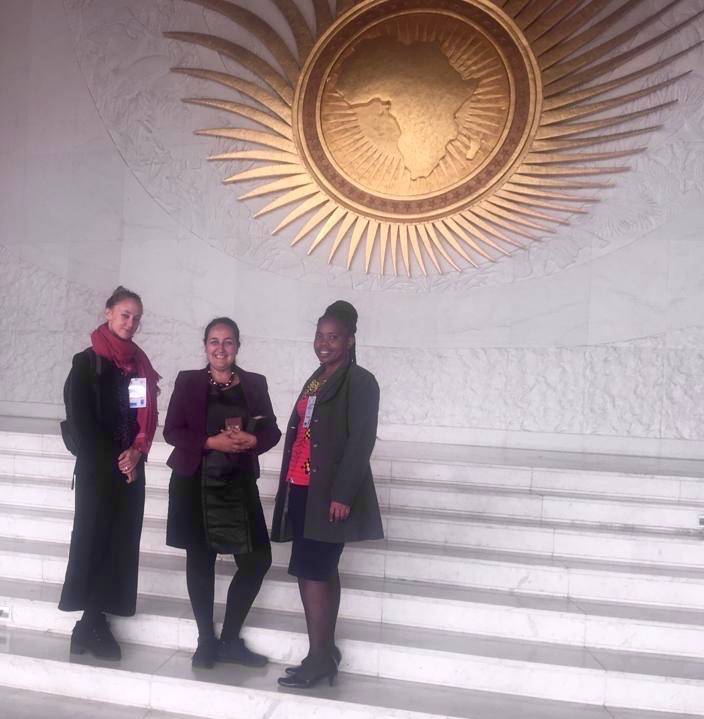In September 2019, we welcomed Florence Situmbeko to the African team, she is based in Windhoek, Namibia. Florence, will bring her long experience as a frontline Social Worker for government, as well as anti-trafficking and project management expertise to support the IDC’s work. We asked her some questions:
The IDC has found that the most successful “alternatives to immigration detention” use individualised case management across all stages of the migration process, to ensure a coordinated approach to each case. Florence – what is your case management/social work experience and what do you see as the value of case work for individuals?
All social workers are trained to be case managers – whether you’re working with individuals, families or groups. My role as a social worker has typically involved listening to my client’s story – why they came to see me or why they were referred to me, following a case through from the beginning until the end. One recent case was a boy whose mother was a Namibian national living in Namibia his father was a citizen of another country. When the father passed away, the boy moved to Namibia to live with his mother. When the boy came to see me, we figured out together what their immediate needs and priorities were. From assessing if he needed a place to stay, something to eat, to see a doctor? We realised he only needed help with acquiring documents so he could reside regularly in Namibia with his mother. I accompanied him to the Ministry of Home Affairs, explained his case, and followed up with the case until he received the documents. I also made sure he was administered an interim receipt that would ensure he was immune to arrest or questioning by the police while his case was being resolved.
beginning until the end. One recent case was a boy whose mother was a Namibian national living in Namibia his father was a citizen of another country. When the father passed away, the boy moved to Namibia to live with his mother. When the boy came to see me, we figured out together what their immediate needs and priorities were. From assessing if he needed a place to stay, something to eat, to see a doctor? We realised he only needed help with acquiring documents so he could reside regularly in Namibia with his mother. I accompanied him to the Ministry of Home Affairs, explained his case, and followed up with the case until he received the documents. I also made sure he was administered an interim receipt that would ensure he was immune to arrest or questioning by the police while his case was being resolved.
Here, you can see that case management can range from more intensive for complex cases, and less-intensive such as administrative support for more self-sufficient migrants who already have their basic needs attended to, like the young boy.
We keep comprehensive, confidential case files on everyone who we assist. Protecting our client’s privacy is paramount, and this also links to our credibility as an Agency. We are able to discuss cases during our monthly reports in which we anonymise cases and share our challenges and shed light on systemic issues and recurring problematic or productive trends.
You mention systemic issues – as a case-worker, have you been involved in policy or advocacy work based on evidence gained through social work practice? In turn, how can evidence-based practice be used to create systemic change?
Yes, as a caseworker, it is worth being engaged with stakeholders who are drafting policies and maintaining good relationships with them – as, afterall, their work directly informs what happens on the ground. Social workers have a unique vantage point as they can feed information from the ground level upwards, illuminating gaps, what is working or what is not to better influence systemic change. If not, such policies are not based on context specific evidence, and we end up assuming.
Social workers have a unique vantage point as they can feed information from the ground level upwards
As a social worker with the Ministry of Gender, the Ministry of Health in Namibia, and then working with IOM, I provided input into legislations or policies. For example, with IOM, I gave inputs on what needs to be taken into consideration when dealing with victims of trafficking, including children, for the development of the Combating of Trafficking in Persons (TIP) Act, no. 1 of 2018 – to ensure the rights of people who might be more vulnerable than others. I was also part of a team that contributed towards the formulation of the Regulations on Human Trafficking and the National Action Plan on Gender Based Violence in Namibia.

How have you worked with other stakeholders as a social worker to bring change and or support the people/”clients” you were working with?
Beyond the policy arena, we work with many other stakeholders to develop support systems for the people we work with. There is no way one institution can fully assist a person as the person has different needs. Therefore, networking is an important part of the social worker’s day to day tasks.
It is worth getting to know the services and organisations around you so you know exactly who to reach out to: “the Red Cross can help me with that”, “my contact at the Home Affairs head office will be able to help me with this”. As well as proving beneficial to the “client”, networking is also useful when it comes to advocating for specific policies/legislation.
Case conferencing is one useful way to maintain your networks and delegate responsibilities to different stakeholders. One case involved several young women who had been trafficked, and who wanted to return to their home country in Zambia. We called a meeting with a shelter manager, IOM, the police, Home Affairs, the social workers from the Ministry of Gender and Office of the Prosecutor General. Through individualised assessment of their cases, we assigned different responsibilities. We were also in contact with social workers in Zambia to ensure that it is safe for the girls to return back home and also ensured that their families were being prepared to receive them. The girls were reintegrated into their communities, after a number of counsellings sessions in order to minimise their vulnerability, for example, one family, based on what they requested received livestock, basic training on how to take care of the livestock and also basic training on financial management. Since the girls were minors arrangements were made for them to return back to school.
Thank you Florence, we are looking forward to working with you.